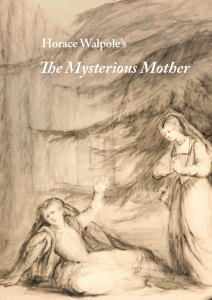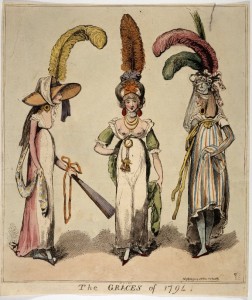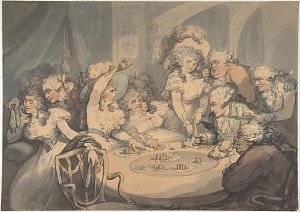Picture this. It is November 1794. The French Revolution has taken a sharp turn for the worse, and Britain and France have been at war for well over a year and a half. The English have recently witnessed the Treason Trials and the suspension of Habeas Corpus at home and the September Massacres, the Reign of Terror, the Glorious First of June, and the execution of Robespierre across the Channel. Soldiers are dying, the British government is locking up radicals, and the nation is in a state of social and political unrest.
It is at this time, at the very height of this tension, that Mary Robinson—the former actress, fashion icon, celebrity sensation, and mistress of the Prince of Wales—debuted her two-act comedy Nobody at London’s Theatre Royal, Drury Lane. The 29 November 1794 performance did not go well. “On the drawing up of the curtain,” Robinson recounts in her Memoirs, “women of distinguished rank hissed through their fans.” And while they were temporarily hushed, they soon resumed their vocalizations “with redoubled violence” (Memoirs 141). Dorothy Jordan, one of the play’s comic leads, became so “agitated” by the audience’s “ill-humour” that she omitted lines from the Epilogue and botched it altogether (The Sun). The Times reported that “the little effect intended, was utterly destroyed.” In the course of only three performances, Drury Lane increasingly “presented a scene of confusion,” with the final staging culminating in a near riot (Memoirs 142).
For modern readers, Nobody may appear merely to offer a lighthearted gibe at voguish faux pas. Fashionable life—comprised of narcissistic daily rituals, risible clothing choices, theatergoing, outings in carriages, and high-stakes gambling—proves, over the course of the drama, both farcical and foolhardy. But what Nobody’s riotous reception makes clear is that Robinson’s spotlighting of fashionable excess was no laughing matter, particularly for some of the play’s aristocratic spectators. Indeed, once the drama is placed within the timeframe of the French Revolution, it becomes clear that Robinson’s critique of fashion is, in fact, a political critique—one that links aristocratic behavior with the welfare of the nation, questions established social hierarchies, and advocates a more meritocratic form of leadership. Even more surprising than its message is that Robinson managed to get the drama staged at all. Produced during the time of the Licensing Act, Nobody reveals how playwrights found ways to circumvent censorship through allusive techniques—a fact that challenges the notion that licensed theater during this time was wholly apolitical.
Over the past twenty years, Robinson’s life and work have received fresh attention from scholars and biographers who have become fascinated, as her contemporaries once were, with her dazzling personality, social prowess, thespian skill, and literary artistry. Despite this resurgence in interest, however, relatively little is known about what was one of her most striking productions: Nobody. It is for this reason that I have recently recovered the play, the controversy surrounding it, and its socio-historical context by publishing an edition of it, along with explanatory notes, contemporary newspaper accounts, visual satire, and other relevant commentary on the academic website Romantic Circles.
Readers of the edition will notice that a central area of fashionable excess the comedy showcases is female gambling. In fact, Nobody focuses attention on the Faro Ladies—a notorious group of high-society women who regularly held gaming parties. Pre-show puffs for the play highlight this element of the comedy. Two-and-a-half weeks before its premiere, The Morning Post, for instance, observes,
The scarcity of Ladies in the lower Side Boxes, may be attributed to the rage from Plays amongst our Dames of haut ton. Faro, and rouge et noir, have wholly banished a gout for rational amusements. This is indeed a serious, disgraceful evil; that “has encreased, is encreasing, and ought to be diminished.” (10 Nov. 1794)
And after mentioning, in a separate issue, that upcoming soirées are to be hosted by Mrs. Concannon, Lady Buckinghamshire, and Lady Archer, The Morning Post remarks,
The proud excesses of the Gay World this Winter will occasion no inconsiderable number of Bankrupts the next. Since the War, the Tradesmen’s Books are over-laded with Debts, and if one of them should press a Nobleman for his money, he is immediately denounced, ‘a Jaçobine!’ (12 Nov. 1794)
By linking aristocratic profligacy with the country’s wartime ills, these lines boldly assert that high-society socialites drain the nation’s coffers, and what’s worse, claim justification in doing so.
Just days before the curtain rose on Nobody, The Morning Post optimistically proposed that dramatic comedy could prove “beneficial to Society” when “the preposterous manners of high life” and “Fashionable Folly” are “checked by the pen of fair and unoffending satire” (13 Nov. 1794). While Robinson certainly intended this outcome for her play, it was, perhaps, too lofty a goal. In the weeks following its condemnation, The Morning Post contained the following entry: “If certain persons, in high life, are allowed to damn every piece that aims to correct their follies, the Stage will cease to be the mirror of the times, and vice will triumph over public opinion” (9 Dec. 1794). While Nobody may not have achieved theatrical success, recovery of the drama reveals how it can yet serve as a “mirror of the times”—one in which domestic welfare contended with aristocratic vice.
Works Cited
For Further Reading
On Mary Robinson’s Nobody:
On Mary Robinson and Her Literature:
- Brewer, William D., ed. The Works of Mary Robinson. 8 vols. Pickering & Chatto, 2009-2010.
- Byrne, Paula. Perdita: The Literary, Theatrical, and Scandalous Life of Mary Robinson. New York: Random House, 2004.
- Davenport, Hester. The Prince’s Mistress: Perdita, a Life of Mary Robinson. Stroud: Sutton Publishing, 2004.
- Gamer, Michael, and Terry F. Robinson. “Mary Robinson and the Dramatic Art of the Comeback.” Studies in Romanticism 48.2 (Summer 2009): 219-256.
- Gristwood, Sarah. Perdita: Royal Mistress, Writer, Romantic. London: Bantam, 2005.
- Ledoux, Ellen Malenas. “Florizel and Perdita Affair, 1779-80.” BRANCH: Britain, Representation and Nineteenth-Century History. Ed. Dino Franco Felluga. Extension of Romanticism and Victorianism on the Net. Web. 2 June 2013.
- Pascoe, Judith. Mary Robinson: Selected Poems. Peterborough, ON: Broadview Press, 1999.
- Robinson, Daniel. The Poetry of Mary Robinson: Form and Fame. New York: Palgrave Macmillan, 2011.
On the Faro Ladies:
- Russell, Gillian. “‘Faro’s Daughters’: Female Gamesters, Politics, and the Discourse of Finance in 1790s Britain.” Eighteenth-Century Studies 33.4 (Summer 2000): 481-504.

 This plot summary of The Mysterious Mother attempts to preserve the flow of information as it is revealed to the viewer. The gothic tragedy opens as Edmund, Count of Narbonne, returns to his ancestral home from the crusades with his friend and fellow soldier Florian. Edmund was banished by his mother, presumably because he arranged to sleep with a lady’s maid, Beatrice, the night after his father’s death. Edmund has had no contact with his mother for sixteen years, though she has sent him money from the estate she has inherited (a breach of patrilineal protocol motivated by her late husband in his love for her). Edmund assumes that she is being manipulated by the priest of the adjacent abbey, Father Benedict, and his protégé Father Martin, but on his return, he finds her defiant, refusing to confess and yet clearly tormented. She is convinced she has hallucinated her husband’s ghost when she first sees him. Edmund, stunned by his mother’s majestic demeanor in the midst of her distress, nonetheless hopes for a reconciliation through his newfound love for her young ward, Adeliza. The Countess misunderstands the proposed union, thinking that Florian loves Adeliza. Father Benedict begins to connect the dots of her guilt, seizes the moment for his vengeful triumph over the Countess, and hastily marries the unwitting Adeliza to Edmund who, when they come to seek the Countess’s blessing, instead drive her to the horrified confession that Benedict has been trying to extract for years: that her sexual longing for her husband, who unexpectedly died before he could return to her bed, drove her to disguise herself as Beatrice, the maid her son Edmund was to sleep with that night, and put herself in his bed. Edmund is unaware of the bedtrick, but the Countess knowingly has sex with her son. They conceive Adeliza and launch a lifetime of alienation and guilt. When the secret finally explodes in the revelation of a now-double incest plot, the Countess commits suicide with a dagger. Edmund, shattered, vows to return to the wars while Adeliza retreats to a convent.
This plot summary of The Mysterious Mother attempts to preserve the flow of information as it is revealed to the viewer. The gothic tragedy opens as Edmund, Count of Narbonne, returns to his ancestral home from the crusades with his friend and fellow soldier Florian. Edmund was banished by his mother, presumably because he arranged to sleep with a lady’s maid, Beatrice, the night after his father’s death. Edmund has had no contact with his mother for sixteen years, though she has sent him money from the estate she has inherited (a breach of patrilineal protocol motivated by her late husband in his love for her). Edmund assumes that she is being manipulated by the priest of the adjacent abbey, Father Benedict, and his protégé Father Martin, but on his return, he finds her defiant, refusing to confess and yet clearly tormented. She is convinced she has hallucinated her husband’s ghost when she first sees him. Edmund, stunned by his mother’s majestic demeanor in the midst of her distress, nonetheless hopes for a reconciliation through his newfound love for her young ward, Adeliza. The Countess misunderstands the proposed union, thinking that Florian loves Adeliza. Father Benedict begins to connect the dots of her guilt, seizes the moment for his vengeful triumph over the Countess, and hastily marries the unwitting Adeliza to Edmund who, when they come to seek the Countess’s blessing, instead drive her to the horrified confession that Benedict has been trying to extract for years: that her sexual longing for her husband, who unexpectedly died before he could return to her bed, drove her to disguise herself as Beatrice, the maid her son Edmund was to sleep with that night, and put herself in his bed. Edmund is unaware of the bedtrick, but the Countess knowingly has sex with her son. They conceive Adeliza and launch a lifetime of alienation and guilt. When the secret finally explodes in the revelation of a now-double incest plot, the Countess commits suicide with a dagger. Edmund, shattered, vows to return to the wars while Adeliza retreats to a convent. 
